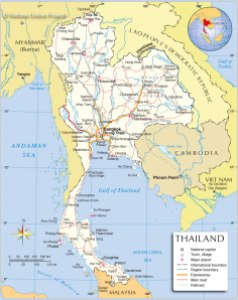For general information about the country profiles click here.
 Population: 66,785,001
Population: 66,785,001
HDI ranking: 103/187
HDI score: 0.69
Decentralization has taken place since 1997 when the 1997 constitution was established. The structure of local government was restructured with more responsibilities and more budgets transferred from the central government. However, bureaucrats and national politicians have a dominant role in the politics of decentralization, and the role of local politicians and local public on decentralization process seems to be much more passive (IDE-JETRO, 2010).
Local governance at a glance
- Thailand has three tiers of government: central, provincial, and local. Provincial governments including 76 provinces are headed by a provincial governor appointed by the central government. 795 districts, 7,255 sub-districts, and 71,864 villages are parts of provincial government (UCLG, 2008).
- The local government has 5 different types: provincial administrative organization, municipalities, sanitary districts, the Bangkok Metropolitan Administration (BMA), and the City of Pattaya (UCLG, 2008).
- The Ministry of Interior determines the administrative status of most local governments (UCLG, 2008).
- Thailand does not have legislative gender quotas at the sub-national level (Quota Project, 2011).
Civil society actors include
- Karen Women’s Organisation (KWO) encourages an awareness of Women’s Rights and to promote women’s participation in the community decision making and political processes.
- NGO Committee on Rural Development (NGO-CORD) represented more than 200 civil organizations has established good relationships among non-profit organizations and to establish links between non-profit organizations and government organizations for forces in rural development work (ADB, 2011).
Capacity building institutions
- Community Organization Development Institute (CODI) assists community groups and Civil Society Organizations to form a network to work together and negotiate with city or provincial authorities, or to influence development planning.
- The National Municipal League of Thailand promotes the cooperation and the relationship municipalities, communities, and all government agencies.
Fiscal control
- The Decentralization Plan and Procedures Act of 1999 enabled local governments to receive grants from other government agencies and ministries (UCLG, 2008).
- The Department of Local Administration of Ministry of Interior is responsible for setting locally collected tax rates (UCLG, 2008).
- The major sources of municipal revenue are grants from the central government. General grant allocations were based on population (150 baht per capita) without earmarking for specific uses (UCLG, 2008).
Key initiatives for participatory local governance
- The 1997 constitution mandates a more decentralized and participatory structure at all levels of government. Chapter 9 called for the direct election of local representatives and featured the need of administrative and political decentralization to local government bodies (UCLG, 2008).
- Under the Decentralization Plan and Procedures Act of 1999, the transfer of the powers and responsibilities from the state to local governments has occurred (UCLG, 2008).
- The 2007 Constitution establishes a series of rights of people and states that when a project is “likely to have impacts on essential interest of the public, the State shall cause to be held comprehensive public hearings prior thereto” (ADB, 2011).
Challenges for participatory local governance
- The Ministry of Interior, as the strongest opponent of decentralization policies, has imposed regulations on several legislative acts that augment its powers and personnel. As a result, provincial governors and district officers still retain considerable authority over local governments (UCLG, 2008).
- Local authorities are classified into forms and each is too small to function well. They lack the personnel and technical capacity (IDE-JETRO, 2010).
- Local government responsibilities are not clearly allocated, and several responsibilities are overlapped and redundant (UCLG, 2008).
- The local public has little information about decentralization and limited capacity to oversee the decentralization process. Only a small number of people are interested in the topic (IDE-JETRO, 2010).
Recent posts on this website about thailand:
- The specter of leviathan in the central-local relations : a comparative historical analysis of the decentralization reform in Thailand and the Philippines (2013)
- Quest for local sustainability : how we balance development policy (2013)
- DELGO’SEA : partnership for democratic local governance in Southeast-Asia (2012)
- Perceptions of local government in Thailand : views of people and local administrators (2012)
- The roles and responsibilities in natural resources and environmental management of local government in Thailand (2012)
- The role of local government in adjusting to population change in Thailand over the next decade (2012)
- Community-driven development in post-conflict and conflict-affected areas : experiences from east Asia : background paper for the 2011 World development report (2011)
- The political economy of decentralization in Thailand : does decentralization allow for peasant participation? : paper (2011)
- Titling against grabbing? : critiques and conundrums around land formalisation in southeast Asia : paper (2011)
- Decentralization policies in Asian development (2009)
List of sources (in order of citation):
Institute of Developing Economics, Japan External Trade Organizations (IDE-JETRO), 2010: “Local Governance in Thailand: The Politics of Decentralization and the Roles of Bureaucrats, Politicians, and the People”
UCLG, 2008: “Kingdom of Thailand”
QuotaProject, 2011: “Thailand”
Asian Development Bank, 2011: “Civil Society Briefs: Thailand”
